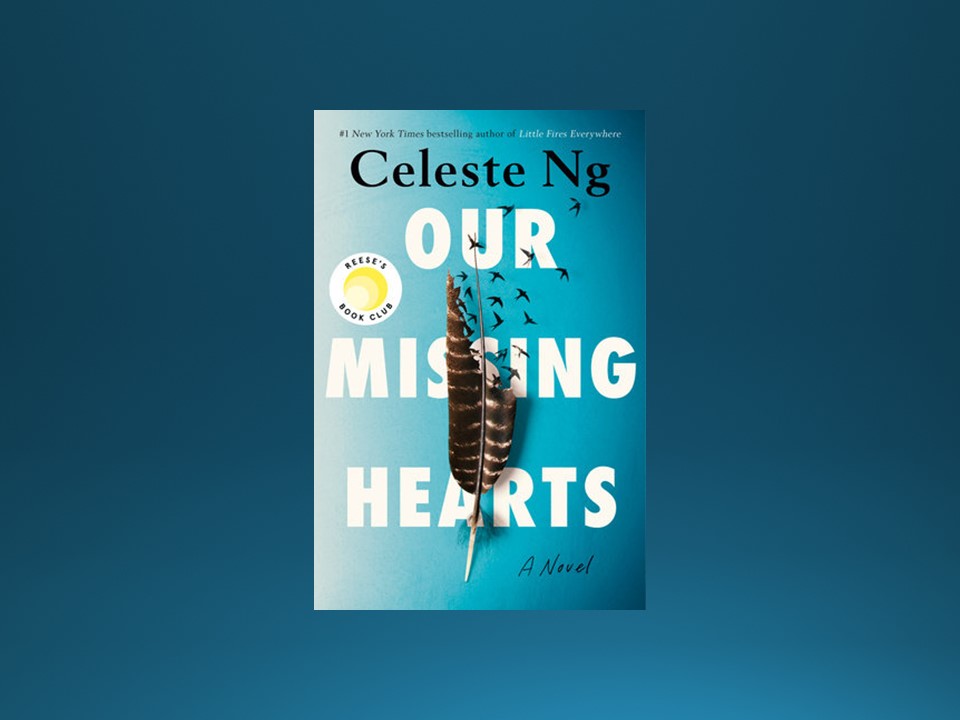Our Missing Hearts, Celeste Ng. New York: Penguin Press, 2022.
Summary: Bird Gardner and his father spend life trying not to be noticed, even as Bird wonders about his mother, the stories she told, why she left them, and where she has gone in a country that turned against her poetry even as one phrase became a rallying cry for all those separated from their children.
This is a haunting work because one sees all the elements except for a PACT act. Economic crisis. Anti-Asian prejudice and violence. The use of blaming foreign powers and actors for our problems. The use of state power to separate children from their parents. The removal of books from schools and libraries. The surveillance state we have lived in since 9/11.
All of this comes together around a twelve year old boy, Bird Gardner, living with his father, who works in an academic library, who loves words, and desperately is working to avoid anything to raise suspicion that could result in Bird being taken away from him. Bird’s mother Margaret left them when he was nine. A book of poems she wrote when she was carrying him, and one poem in particular with the line “our missing hearts” became associated with the rallying cry and symbol of a resistance movement to the forced removal of children from their homes for the least suspicion of violating the PACT Act (Preserving American Culture and Traditions).
Although his father has taught Bird that they must disavow her and have no communication with her, he both misses her and wonders why she would leave them and what she is doing now. Sadie, a school friend, and one of the removed children, thinks his mother is part of the resistance movement that, out of nowhere puts up protest installations of hearts or other symbols of the missing children.
But Bird doesn’t learn the true story until a series of clues that begins with a letter without return address covered with cat drawings leads to looking in a closet in their former home (still owned but closed up while they live in a dorm apartment), where Bird finds an address in New York City.
With the help of a librarian, who is part of an underground network of librarians who are collecting a database of parents and missing children, Bird figures out how to get to New York where he reconnects with his mother through a rich mutual friend, Dutchess (Domi) who lives at the address he’d found. Over several days in a derelict house, his mother tells the story of her life–how she and Domi survived the Crisis which led to the passage of the PACT act, how she met Bird’s father, wrote a book of poetry with paltry sales until the death of one protestor carrying the words “our missing hearts” was captured in a photograph at the moment she was fatally shot. The book was found among her effects, sold like crazy until the authorities shut it down, and vilified the author, who’d never meant to spawn a resistance.
She tells of the decision to leave to save Bird from being parted from both parents, and her awakening as she learned of what had happened to so many children that she had avoided knowing. She tells the story as she makes bottle cap devices with wires and transistors and “seeds” these throughout the city for her own act of resistance.
I have not heard the audio version of this but the voice I hear is one of quiet, but insistent wondering, both of Bird, and then of Margaret. Each is trying to unravel a story, Bird of his mother, Margaret of all the lost children, beginning with the young woman who died in protest. Both are engaged in a quiet resistance rooted in the pursuit of truth–unwilling to accept any longer the “comply and keep your head down” ethic fostered by PACT. Even Bird’s decision at the very end reflects that quiet, resistant pursuit of truth.
The haunting thing about this book is the awareness that the dystopian state Ng portrays is not that far removed from our present day reality. As I mentioned in the beginning, nearly all of the pieces are there. I suspect most of us are, like Margaret, among those who do not want to see, who think, this cannot happen here. The author of Little Fires Everywhere could have called this Little Resistances Everywhere. Ng portrays what a resistance of truth that will not bow to power might look like. And in doing so, this book feels like it is Ng’s own quiet act of resistance.

The PACT Act puts me in mind of the edict issued by Texas Governor Greg Abbott earlier this year requiring Child Protective Services to investigate, (with the potential for child removal) families who sought transgender care for their children. No matter what one believes about this issue, the state intervening in these families lives this way is all about attempts to “protect American culture and traditions”, at least as viewed through the lens of the Texas government’s far right Evangelical Christianity. Our next legislative session begins in early 2023. I fully expect horrible laws targeting LGBTQ individuals to come out of this session, including many directed at children and families.
LikeLiked by 1 person
That is disturbing. As an evangelical Christian, minus the “far right,” what most concerns me is the making of cultural identity into a kind of god, or ultimate allegiance, which the Bible would call apostasy and idolatry. I am deeply concerned about the “othering” implicit in all this and the use of state power to inflict harm, simply for not being “like us.”
LikeLike
Pingback: The Indies First Campaign | Bob on Books
Pingback: The Month in Reviews: November 2022 | Bob on Books
Pingback: Bob on Books Best of 2022 | Bob on Books